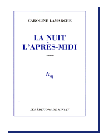Auteurs contemporains
Discours critique sur les œuvres de littérature contemporaine
Outils pour utilisateurs
Outils du site
La nuit l'après-midi
 Caroline Lamarche, La nuit l’après-midi, Paris, Spengler, 1995.
Caroline Lamarche, La nuit l’après-midi, Paris, Spengler, 1995.
« Une femme ne se souvient pas de son enfance. Sauf d’une chose, dont elle fut délivrée autrefois par l’amour d’une servante, et qu’elle tente de revivre en répondant à une petite annonce. Dès lors, à la douleur qu’elle connaissait avec Gilles, son amant, se substitue la douleur infligée sur demande par l’homme roux. »
(Quatrième de couverture)
Documentation critique
LORENT, L.-E., « À ras le corps, à ras le coeur… Trois romancières belges », Revue nouvelle, vol. 107, n° 4 (1998), p. 74-81. +++ Article de revue
###Dans le roman français, tel que les hommes l’écrivent depuis trois siècles, le corps de la femme joue souvent un rôle très important, mais c’est un rôle univoque et passif : le corps de la femme y est essentiellement l’objet du désir de l’homme. Il en est tout autrement pour Nicole Malinconi dont un des buts est de donner la parole aux femmes sociologiquement muettes afin qu’elles puissent exprimer leurs sentiments profonds et dire leur corps dans son quotidien et surtout dans ses douleurs, ce corps qu’il faut nourrir et laver, dont le ventre peut saigner et s’alourdit parfois d’un enfant non désiré. Le point de départ de Caroline Lamarche est tout différent. « Jusque-là tout passait chez moi par le regard et le cerveau » (La Nuit… p. 60). Dorénavant elle veut libérer son corps de l’armure plaquée par une éducation bourgeoise et retrouver l’époque où, toute petite, elle avait chaud en étant nue. Elle veut dénuder le coeur aussi, lui arracher ses défenses et l’ouvrir au monde. Pour Amélie Nothomb enfin, l’enjeu eût été d’empêcher le corps de l’enfant de grandir : les adultes ne sont que des enfants déchus. Devant l’impossibilité de réaliser ce désir, la romancière semble se réfugier dans les jeux de l’esprit dont on sait qu’ils peuvent être aussi cruels que ceux du corps. ###
ARDUS, Fabienne Eliane, « Discours de l’altérité en Belgique francophone contemporaine : Claire Lejeune, Caroline Lamarche, Nicole Malinconi et Amélie Nothomb », thèse de doctorat, Department of French, University of Southwestern Louisiana, 1999, 186 f. +++ Thèse de doctorat / mémoire de maîtrise
###Abstract
« Because of the federalisation of the Belgium Kingdom, the French speaking Belgians, nowadays actually in minority, were urged to redefine themselves and to decide on a long term strategy to reposition themselves within the country. It is therefore in the seventies, the federalisation process having starting in 1970, that “identity discourses” slowly found their way in the French speaking part of Belgium.
A real mobilization of the people voice on the matter of the identity problematic has never occurred: the interventions on this subject were always sporadic, spread out over more then two decades, and from different groups often in discord. Nevertheless, in confronting such multitude of diverse sources from the late 70s up to the late 90th, this research revealed a mainstream discourse concerning the identity definition process of French speaking Belgians. The mainstream discourse revealed is considered here as a “projet de société”. This “projet de société” take the shape of a “discourse of Alterity”. Every intervention is based on a process of inclusion instead of exclusion, never the identity will be define from within the “Me”, and when the “Me” is mentioned it is to be itself disarticulated and rebuilt according to new datas coming from the outside, coming from the “Other”.
This discourse of Alterity finds its home in the writing of the poet, philosopher and essayist, Claire Lejeune. Comparing what she called her “Relation dialogique” with the “Poétique de la Relation” of Edouard Glissant integrates the Belgian process of identity on a worldwide scale and, at the same time, brings out the specificities of the Belgian discourse. The fictional work of Nicole Malinconi, Caroline Lamarche and Amélie Nothomb clearly illustrate this theory of the “relation dialogique” which is the essence of the Discourse of Alterity. Comparing scientific discourse about the identity process in philosophical and economical journals, in newspapers, compilings of personal experiences and pieces of literature helped to display this Discourse of Alterity so deeply-rooted in the francophone Belgium.
This internalization of the “Other” could be revealed by our analyse of the corpus, even if it is in fact a subconscious process. The studied corpus revealed that, in french speaking Belgium, the “Other” has been internalized and assimilated, leading the individual to a permanent redefinition of the subject always opened to the “Other”, therefore always evolving, rejecting any kind of permanent categorisations. This tendency may be the reason why French speaking Belgians encounter so many difficulties in rallying themselves around a definition of their community and their identity. Some theories view this process as a proof of alienation. This study supports a discourse which claims that openness and permanent revolution in the identity process is the only healthy answer to the inevitably globalisation of our society. »
Corpus retenu
La nuit l’après-midi, Le jour du chien
La version PDF de la thèse est disponible pour les membres de communautés universitaires qui ont un abonnement institutionnel auprès de UMI - Proquest.###
| La nuit l'après-midi (oeuvre) | |
|---|---|
| Titre | La nuit l'après-midi |
| Auteur | Caroline Lamarche |
| Parution | 1995 |
| Tri | nuit l'après-midi |
| Afficher | oui |